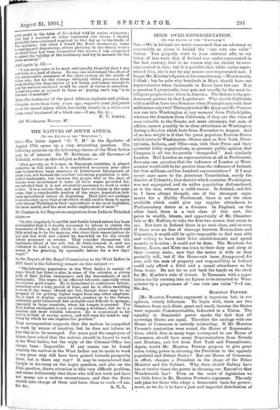THE NATIVES OF SOUTH AFRICA.
LT0 THE EDITOR OF THE " SPECTATOR."1
SIE,—The letter signed " C. V. H." in the Spectator of August 17th opens up a very interesting question. The following opinions on the labouring classes of the West Indies may be of interest. Sir W. Robinson, an old Governor of Trinidad, writes on this subject as follows :— " Real poverty, as it is seen in European countries, is almost unknown in this island: it is considered necessary year after year to introduce large numbers of Indentured Immigrants at great cost, not because the resident labouring population is alto- gether inadequate, but because the people who in the days of slavery were accustomed to have all their wants provided for, are satisfied that it is not absolutely necessary to work in order to live. It is a curious fact, and may have its origin in the same cause, that a considerable portion of the negro population look upon agricultural labour as degrading. They have not perhaps been educated up to that point which would enable them to agree with George Washington that agriculture is the most healthful, the most useful, and the moat noble employment of man."
Dr. Comins in his Report on emigration from India to Trinidad states
"In this singularly beautiful and fertile island nature has been so bountiful that it is hardly necessary to labour to obtain the necessaries of life—a fact which is cheerfully acknowledged and fully acted up to by the negroes, who since their emancipation do less and less work and cannot be depended on for the steady labour necessary on estates. They consider themselves the legitimate tillers of the soil, but do little towards it, and are contented to lead a lazy existence, varied, when the want of money is too pressing, by spasmodic labour for a few days' wages.
In the Report of the Royal Commission to the West Indies in 1897 there is the following remark on this subject :— " The labouring population in the West Indies is mainly of negro blood, but there is also, in some of the colonies, a strong body of East Indian immigrants and the descendants of such immigrants. The negro is an efficient labourer, especially when lie receives good wages. He is disinclined to continuous labour, extending over a long period of time, and he is often unwilling to work if the wages offered are low, though there may be no prospect of his getting higher wages from any other employer. He is fond of display, open-handed, careless as to the future, ordinarily good humoured, but excitable and difficult to manage, especially in large numbers, when his temper is aroused. The East Indian immigrant is not so strong a workman, but be is a steadier and more reliable labourer. He is economical in his habits, is fond of saving money, and will turn his hand to any- thing by which he can improve his position."
Your correspondent suggests that the natives be compelled to work by means of taxation, but he does not inform us how this is to be managed. For years past the employers of labour have asked that the natives should be forced to work in the West Indies, but the reply of the Colonial Office has always been : Impossible. If any means can be found whereby the natives in the West Indies can be made to work a very great step will have been gained towards prosperity there, but is there any way P It may be remembered that Carlyle in his essay on the negro question, and also on the Irish question, draws attention to this very difficult problem, and states deliberately that those who will not work and have not means are a useless encumbrance, and that the State should take charge of them and force them to work.—I am,


































 Previous page
Previous page